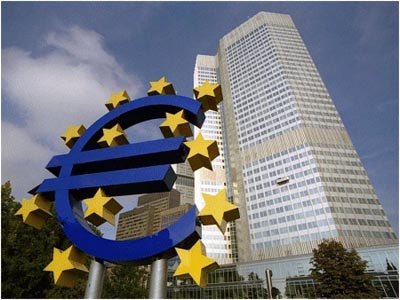European Central Bank expected to slash rates as economy slumps
 Frankfurt - The European Central Bank (ECB) is expected to deliver Thursday a deep cut in borrowing costs as the wave of rate cuts across the global economy gains momentum.
Frankfurt - The European Central Bank (ECB) is expected to deliver Thursday a deep cut in borrowing costs as the wave of rate cuts across the global economy gains momentum.
But economists are divided on the size of the reduction the ECB will deliver with many believing that slumping economic growth and dwindling inflation will result in the bank slashing rates by 75 basis points or even 100 basis points.
A cut of 75 basis points or more would represent an unprecedented move by the ECB, which during its brief history in charge of eurozone monetary policy has not reduced borrowing costs by more than 50 basis points at a time.
"But this is not business as usual", said Klaus Baader, Merrill Lynch's London-based chief European economist. "The current economic conditions warrant unprecedented action."
Economic sentiment in the eurozone tumbled to a 15-year low in November, a key survey released last week showed, after the currency bloc tipped into recession in the third quarter.
The sharp economic contraction is already starting to filter through to the eurozone's jobs market, with unemployment posting its biggest monthly increase in October surging to reach its highest level in nearly two years of 7.7 per cent.
Convening in Brussels at one of its regular out-of-town meetings, the Frankfurt-based ECB's 21-head rate-setting council's decision on Thursday will also coincide with ECB chief Jean-Claude Trichet releasing the bank's latest so-called staff projections, setting out new inflation and economic growth forecasts.
These are forecast to underscore the dramatic economic slump underway in the 15-member since the release of the last projections in September with the figures tipped to show economic growth coming to a halt next year amid a plunge in inflation to below the ECB's annual two per cent target.
Instead of growing by 1.2 per cent as set out in the September staff projections, Thursday's figures are expected to show the eurozone economy contracting by 0.5 per cent.
Eurozone inflation hit a 16-year high of 4 per cent in the middle of the year as oil prices headed towards a record of nearly 150 dollars a barrel.
But since then oil prices have retreated significantly with data released last week showing annual eurozone inflation chalking up its biggest fall in almost 20 years in November to drop to a lower-than-forecast 2.1 per cent from 3.2 per cent in October.
As a result, Thursday's staff projections will say annual eurozone inflation fell to 1.5 per cent in 2009, analysts say. In September, the staff projections had forecast a 2.6-per-cent inflation rate next year.
Apart from the deepening economic gloom surrounding the eurozone economy, adding to the pressure on the ECB to go further than
50 basis points on Thursday has been the big cuts in rates around the world.
In addition to the Bank of England's massive 150-basis-points reduction four weeks ago and the rapid-fire cuts delivered by the US Federal Reserve, Switzerland's normally conservative national bank last month chopped 100 basis points off rates.
Meanwhile, China announced the biggest reduction in borrowing costs in the country since the Asian financial crisis a decade ago. Australia's Reserve Bank this week delivered its fourth rate cut in as many months this month.
But despite the pressure for the ECB to respond to the bleak economic outlook by dramatically easing monetary policy, most economists believe the ECB will trim rates again on Thursday by 50 basis points.
A 50-basis-points reduction would bring the ECB's benchmark refinancing rate down to 2.75 per cent with economists also expecting the ECB to press on with its rate-cutting cycle well into the new year.
Moreover, a 50-basis points cut on Thursday would also mean that the ECB has trimmed rates by 150 basis points since it joined the world's other leading central banks in early October as part of coordinated moves to help spur economic growth by cutting the cost of money. (dpa)